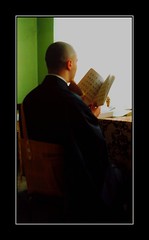We inherit from our ancestors gifts so often taken for granted... Each of us contains within... this inheritance of soul. We are links between the ages, containing past and present expectations, sacred memories and future promise.
-- Edward Sellner
Svadhyaya is the fourth of the niyamas of the Yoga Sutras, and has acquired two meanings over the centuries. The classical thought translates Svadhyaya as "study sacred texts," and has become the observations of "investigate the Divine," and "learn continuously." The more modern concept, looking towards the intent of this sutra, is "study the Self," or -- still wrestling with the limitations of the English language -- "study the soul."
There is the story of two arguing students who went before the Zen master to plead their cases. The first presented his argument, and the master replied, "Yes, yes, this is true." The second student spoke up and likewise gave his appeal. After a moment's reflection, the master said again, "Yes, yes, this is true." The first student, feeling cheated, exclaimed, "But Master, both of our arguments cannot possibly be true!" The Zen master smiled and replied, "Yes, yes, this is true."
In our Western, scientific way, we like to take things apart and look for the intrinsic minutia to give us insight into how things work. We disassemble and dissect: "Sva" means "self" or "personal possession;" "dhy" is the root of "dhyana" which means "meditation;" "ya" is an activation suffix; but also, "adhyaya" means "study" or "inquiry." We take apart the clock, examine the gears and springs, and see the intent of the clockmaker. But are we any closer to understanding the concept of Time?
To keep this text short I won't pull supporting quotes, but suffice to say that every major human religion contains a common core concept: purification of an intangible, non-physical inner self, or soul, as the way to the Divine. Definitions of these words and concepts and the prescribed paths to follow fill the volumes of the sacred texts.
If we believe that Svadhyaya is the study of these holy works, then "this is true." But each golden path is exclusive. If Islam is the one true religion, then Hinduism is false. If Christianity is the sole way to heaven, then Buddhism is heresy. An adherent to each religion knows that their path is the one true way. And the Zen master, hearing us exclaim that all these mutually exclusive beliefs cannot possibly be true, calmly replies, "Yes, yes, this is true."
Paradox illuminates what isn't there. We take the watch apart, but fail to find Time. We surgically dissect the tissues of the body and brain, but the soul eludes us.
Paradox shows us where there is a gap in our understanding. Think of all our definitions for the word "light." But if we dissect light, we find that sometimes it is a wave, and sometimes it is a particle, all dependent upon how we observe it. And yet light is mundane, everywhere, from the cosmic cradle to the bedside lamp. We know it, but yet we don't.
Our search for the elusive Self, through the vehicle of the sacred texts, may be likened to the blind men and the elephant. Feeling the trunk, the blind man discovers the elephant to be like a serpent; at the leg, it is like a tree; at the tail, a rope. "Yes, yes, this is true," we are told. Until we are no longer blind, what we know is true. When we can see, we may find that what we know is both true and not true.
All that lives, dies. This is the grand paradox of human consciousness. Everything that we are and do is impermanent and will be washed away. So what is the point of living? When we ask these questions, "Who am I?" or "Why am I here?" we find ourselves in the company of students and sages, prophets and priests. It is our discovery of Self and our search for meaning that gives bloom to the flowers of religion and philosophy.
Study, Patanjali tells us. Examine existence. Question everything. Learn from those who have asked these questions before. Look within.
Svadhyaya is not the answer. Svadhyaya is the question being asked.
